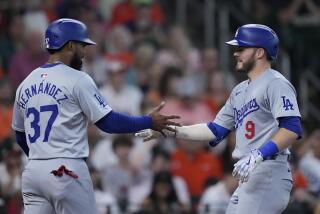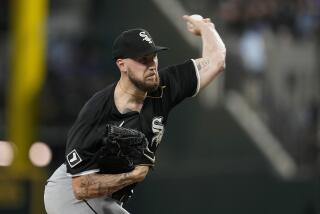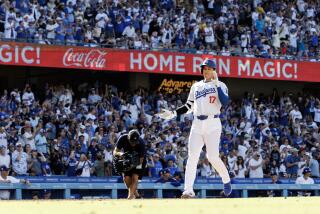Wishing Upon Star Too Costly
- Share via
YUMA, Ariz. — Joe McIlvaine can get a little testy when the subject of Benito Santiago comes up, as in what to do with him.
It seems unlikely that the Padres will be able to sign him when his contract expires at the end of the season. Ownership just does not seem inclined to spend the kind of bucks it will probably take.
In that sense, McIlvaine’s hands are tied.
Another option would be to let Santiago play out the season and let him walk in the direction of the highest bidder. This will make the multitudes grumpy.
But McIlvaine’s hands are tied because . . .
His last option is to trade the All-Star catcher. The problem here is getting sufficient in return, because no one else will want to pay too high a price for a guy who could be gone in October.
Yes, McIlvaine’s hands are bound so tightly his fingers are probably turning white.
“I hope people realize that,” he said. “When you’re dealing with finances, you’re not dealing with value for value. You look at the situation with Pittsburgh and John Smiley and that’s a microcosm of what’s happening.”
Smiley was in Santiago’s situation, entering the last year of his contract and in danger of being lost for what amounts to nothing in return. Pittsburgh traded him to Minnesota for two prospects who might well be suspects.
“Did Pittsburgh get true value for a 20-game winner?” McIlvaine asked, knowing well what the answer was. “They get a player from the Midwest League and another player who split time between AA and A. They may end up being super players, but who knows? You used to be able to trade a 20-game winner for someone who’d help you right away.”
This is the dilemma McIlvaine faces as he contemplates the option of trading Benito Santiago before he is just gone. The fact that the Toronto Blue Jays had inquired as to his cost and availability stirred rumors--that nasty word--about an impending deal.
“We haven’t done anything,” McIlvaine said tersely. “One club called and that’s one of about 100 things that’ll happen during the course of a week. It’s not any more likely to happen than any of the other rumors.”
He paused. He was bundled up in the stands Monday night, fighting the chill of a desert wind that blew away the heat of the day. His Padres were in the midst of a springtime exercise with the Chicago Cubs.
“I wish, I wish, I wish,” he said. “And I say that three times. I wish, I wish, I wish, that this was still like the baseball trading card days. I wish we could still say, ‘This guy can help us and we can afford to give up this guy.’ I wish that would be it.”
It isn’t. Not any more. Everyone has ideas. Fans do. Writers do. Even players do.
General managers are not in a fantasy world. They deal with reality.
“Three things come into play before you can make a trade,” McIlvaine said. “First is the player’s contract. Second is how long it runs. Third, and last, is value for value.”
For most of baseball’s first 120-some years, value for value was the main criteria. General managers were measured by what they got and what they gave. The good ones built reputations for getting more than they gave.
In today’s world, general managers do not get measured quite so easily. Any attempt to so simplify the evaluation of a general manager comes up short in terms of fairness.
What if, for example, McIlvaine traded Santiago for a triple A catcher and a double A pitcher?
The outcry would be deafening, but that may be the best he might be in position to do.
Ironically, McIlvaine himself pulled off one of the rare contemporary value-for-value trades in his first off-season, 1990-91, when he sent second baseman Robbie Alomar and outfielder Joe Carter to Toronto for first baseman Fred McGriff and shortstop Tony Fernandez.
“Kansas City and the Mets pulled off a pretty good one this year too,” he said, that being Bret Saberhagen to the Mets for Kevin McReynolds, Gregg Jefferies and Keith Miller, “but our trade with Toronto was close to that. Basically, it was two stars for two stars. The beauty of that trade was that you add up the ages and it was even and add up the money and it was about even, then at least, and it was truly value for value.”
Equally ironic, McIlvaine is still asked to defend that trade.
“Look,” he said, “we had one infielder we had confidence in, Robbie Alomar. We were looking at maybe Jerald Clark playing first base, Garry Templeton was finished at short and we were looking for a third baseman. Our strength was our young outfielders, Jerald Clark, Thomas Howard, Darrin Jackson and we hoped Shawn Abner. We trade Alomar and an outfielder and take care of first base and shortstop. Now we have Kurt Stillwell to solidify second base and we’re much better off.”
Third base is still a problem, of course, but trading Benito Santiago will not likely solve that. It would be nice if it would. You cannot trade a star for a star, not when one of them is in the last year of a big money contract.
“Speaking of money,” McIlvaine mused. “Look who’s up.”
The batter was Ryne Sandberg, the $7.1-million man.
He popped to short. That one at-bat was certainly not value for value.
More to Read
Are you a true-blue fan?
Get our Dodgers Dugout newsletter for insights, news and much more.
You may occasionally receive promotional content from the Los Angeles Times.










